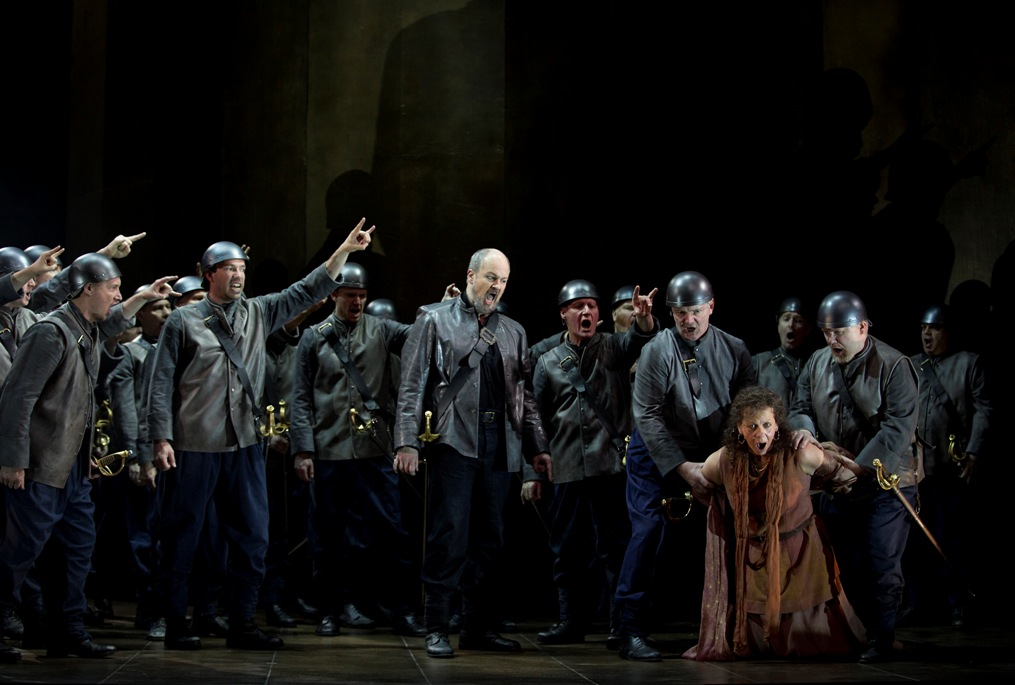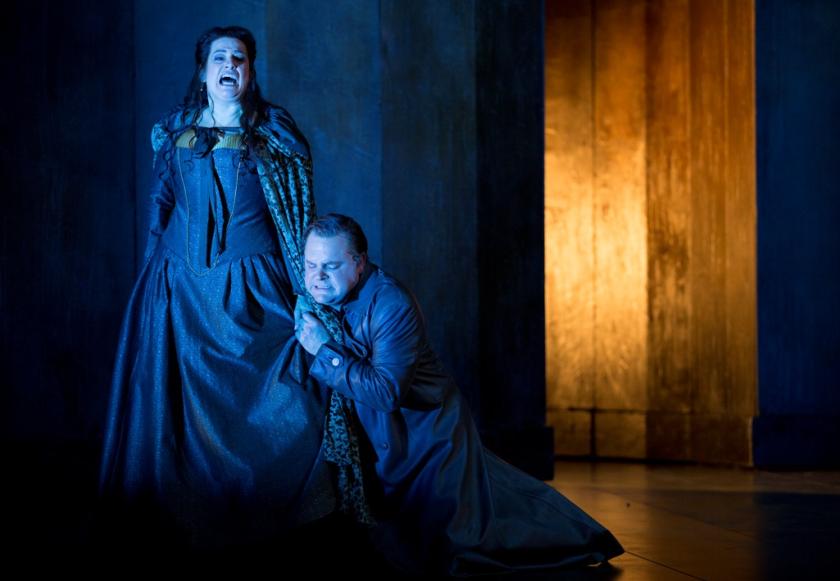"The darkness deceived me," sings Leonora in Act I as she mistakenly rushes into the arms of the Count di Luna, rather than those of her beloved, the mysterious troubador Manrico who’s been serenading her for nights on end. Seeing Robert B Dickson’s sepulchral lighting in Scottish Opera’s semi-new production of Verdi’s melodramatic shocker Il trovatore – an updated version of the company’s 1992 staging – you can understand why. The production’s Caravaggio-esque gloomy depths and ominous, looming shadows (used to particularly grotesque and unsettling effect in the famous "Anvil Chorus") soon make the point that the work is indeed unremittingly dark, but they don’t do much to highlight its almost camp excess or its credulity-testing plot twists.
Which is a shame, because the show’s performances – at least vocally – are almost universally exceptionally strong, and vividly characterised. Top of the heap is Claire Rutter as a touchingly naive, heartstring-tugging Leonora, seemingly unaware of the high gothic melodrama she’s in the middle of, and singing with moving restraint and an astonishing vocal control. Her subtle vocal swells whenever she’s near her beloved Manrico tell us all we need to know about her idealised longing.
 Gwyn Hughes Jones makes a very lucid, expressive Manrico, with a laser-like focus to his quite piercing tenor and a vocal vigour to match. And Anne Mason (pictured right being restrained by Ferrando's men) is suitably sultry but affectingly sincere as the gypsy mother Azucena. Roland Wood might bellow somewhat as the Count, but there’s a rugged determination to his portrayal nonetheless. The chorus is on highly impressive form, and eloquently choreographed by Kally Lloyd-Jones. Male for the most part (save in a brief scene of limpid beauty as the nuns gather to welcome Leonora into the convent), their singing is crisp and immaculately drilled, and startlingly powerful at times.
Gwyn Hughes Jones makes a very lucid, expressive Manrico, with a laser-like focus to his quite piercing tenor and a vocal vigour to match. And Anne Mason (pictured right being restrained by Ferrando's men) is suitably sultry but affectingly sincere as the gypsy mother Azucena. Roland Wood might bellow somewhat as the Count, but there’s a rugged determination to his portrayal nonetheless. The chorus is on highly impressive form, and eloquently choreographed by Kally Lloyd-Jones. Male for the most part (save in a brief scene of limpid beauty as the nuns gather to welcome Leonora into the convent), their singing is crisp and immaculately drilled, and startlingly powerful at times.
Down in the pit – the lighting of which, even with stand lights, threatens to distract attention from the dingy stage – Swedish conductor Tobias Ringborg has the Scottish Opera Orchestra in fine fettle, their playing bright and bold, gloriously blaring at times. There’s a convincing Verdian sweep to Ringborg's broad phrasing, a gentle suppleness to his rhythms and a crisp clarity to his textures.
In musical terms, it’s a roaring success. But most of the production’s drama is squarely within the music, because there’s not a great deal of it in the rather unambitious, static staging. It falls uncomfortably between detailed naturalism and stylised conceptualism – all looming monoliths and projections of smoke and fire – and as a result feels like it does little to dig into the more serious themes behind the work’s macabre excess, or even to present that exuberance in all its gory glory. Too often the characters simply stand and sing at the audience. We may be moved by the subtleties and power of their vocal deliveries, but it’s hard to feel particularly compelled or convinced by the storytelling.
- Scottish Opera’s Il trovatore tours to Edinburgh (21, 24, 27 & 30 May), Inverness (4 & 6 June) and Aberdeen (11 & 13 June)















Add comment